People
Contents at a Glance
Individual Profiles
Country Coordinators
Anuradha Srinivasan Echambadi - India Country Coordinator
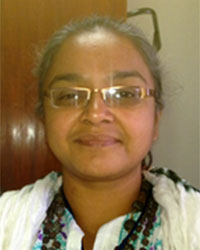
Ms. Echambadi has worked extensively on disability rights, most recently on the Hear Our Voices Project, a National Coalition for preparing the Alternate Report to the UNCRPD, to be presented to the Committee for CRPD. Anu works as a resource person for Swadhikaar. She has worked as a freelancer for NGOs and INGOs working in areas of disability and women's equality. She has also held worked in various capacities for disability rights projects across India. Anu is the DRPI AWARE Country Coordinator for India.
To Be Determined - Bangladesh Country Coordinator
Sagar Prasai - Nepal Country Coordinator
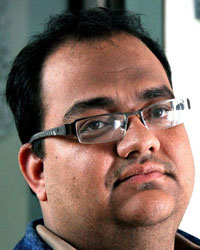 Sagar Prasai is a young and enthusiastic social activist from Nepal who has been advocating for disability rights and providing direct services to people with disabilities of Nepal for over seven years. Sagar's career has included teaching computer skills to people with disabilities at the National Rehabilitation Society for the Disabled (NRSD), where he also initiated an innovative program called Audio Books for visually impaired people - a zero budget program producing more than 200 audio books in a year. Sagar has also worked with Wateraid an international NGO. He also helped some development agencies including USAID, Nepal in their strategic planning to develop socially inclusive programs. In 2013, he was selected for a US Department of State funded fellowship called “Community Solutions Program”. He stayed in the United States for 4 months working at the Institute for Community Inclusion at University of Massachusetts, Boston. Sagar is a constant dreamer and believer in change and he is working everyday with all his capacity to uplift the life status of people with disabilities in Nepal.
Sagar Prasai is a young and enthusiastic social activist from Nepal who has been advocating for disability rights and providing direct services to people with disabilities of Nepal for over seven years. Sagar's career has included teaching computer skills to people with disabilities at the National Rehabilitation Society for the Disabled (NRSD), where he also initiated an innovative program called Audio Books for visually impaired people - a zero budget program producing more than 200 audio books in a year. Sagar has also worked with Wateraid an international NGO. He also helped some development agencies including USAID, Nepal in their strategic planning to develop socially inclusive programs. In 2013, he was selected for a US Department of State funded fellowship called “Community Solutions Program”. He stayed in the United States for 4 months working at the Institute for Community Inclusion at University of Massachusetts, Boston. Sagar is a constant dreamer and believer in change and he is working everyday with all his capacity to uplift the life status of people with disabilities in Nepal.
Local Specialists
Kuhu Das - Gender Analysis Specialist
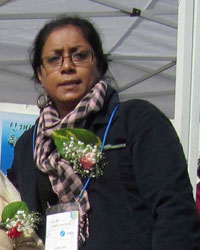
Kuhu founded the Association for Women with Disabilities (AWWD) in West Bengal, India in 2002 and is currently its Director with 9 years of experience working on empowerment and mainstreaming of women with disabilities (WWD). Her work focuses on creating a strong platform through facilitating networks among WWD at all levels and capacity development of WWDs in leadership and advocacy so they can act as a collective voice. She has conducted leadership training at various levels in South Asian countries and India. Kuhu also has 15 years of experience in disability, gender equality & women’s empowerment issues and 10 years of project assessment and evaluation experience.
Canadian Partners
Marcia Rioux, York University (Project Leader)
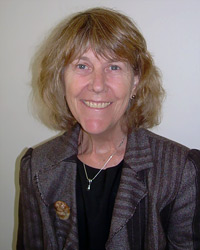
Marcia Rioux is a Professor in the School of Health Policy and Management; in the MA and PhD (Critical Disability Studies) and in the MA / PhD in Health Policy and Equity at York University, Toronto, Canada. She is the Director of the York Institute of Health Research (YIHR). She works with many disability organizations and has published and consulted widely on disability and human rights and disability policy issues, both nationally and internationally. Marcia has lectured throughout the Americas, Europe, Africa and Asia. She advises federal and provincial commissions, parliamentary committees, and international NGO's as well as United Nations agencies. She recently published with Brill Press, Critical Perspectives on Human Rights and Disability Law, (edited by M. H. Rioux, L. Basser, M. Jones).
Normand Boucher, Laval University
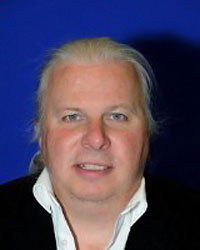
Normand Boucher is an adjunct professor in the School of Social Work at Université Laval. Over the last 10 years, he has been involved in the disability movement of Québec and cofounder of the Association of Student with Disabilities at Université Laval. With a PhD in Sociology from Laval University, he has carried on his post-doctoral studies in the Centre for Disability Studies at the University of Leeds in the UK. He works on issues related to citizenship of people with disabilities in the postindustrial society at the International Network on Disability Creation Process. At the Centre for Interdisciplinary Research in Rehabilitation and Social Integration (CIRRIS), his research focuses on employment, housing, transport, and support Services.
Annie Bunting, York University
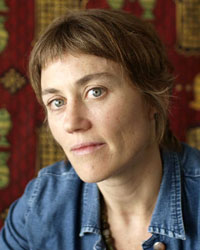
Annie Bunting is an Associate Professor in the Law & Society program at York University in Toronto, teaching in the areas of social justice and human rights. Professor Bunting is a graduate of York, having studied law at Osgoode Hall Law School (1988). She received her LL.M. from the London School of Economics and Political Science (1991) and her SJD from the Faculty of Law, University of Toronto (1999). The topic of her doctoral dissertation is international women's rights, culture, and the case of early marriage. She has published articles in Social and Legal Studies, Journal of Law and Society, Canadian Journal of Women & the Law, and chapters in various book collections. She has served on the Editorial Board of Law & Social Inquiry and the Muslim World Journal of Human Rights. She currently directs a 5-country research project on enslavement of forced marriage in war.
Rachel Gorman, York University
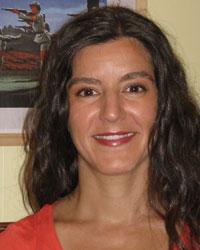
Rachel Gorman is an Assistant Professor in Critical Disability Studies at York University. Her areas of focus are political economies of disability; Disability Arts and Culture movements; postcolonial and dialectical materialist approaches to understanding the social organization of disability; disability in the context of nationalisms, transnational imperialism, and national liberation; internationalist and anti-capitalist approaches to global healthcare provision.
Cameron Graham, York University
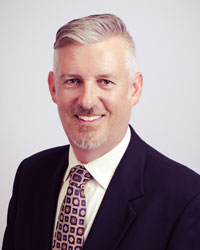
Cameron Graham is Associate Professor of Accounting and Area Coordinator, Accounting for the Schulich School of Business at York University. His research looks at the social role of accounting. In doing so, he looks at accounting in settings that are often ignored by accounting researchers, such as government programs or organizations like the World Bank, particularly settings where poverty is endemic. This has led him to study topics like old age pensions, homelessness, and Canada's First Nations, using a variety of qualitative research methods to develop rich data sets. The theories he uses are drawn from postmodern social and linguistic theorists who offer a vocabulary for redescribing the taken-for-granted, allowing a new perspective on the many forms of accounting in society.
Thomas Klassen, York University
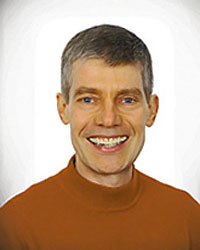
Thomas Klassen is a Professor in the Department Political Science, and the School of Public Policy and Administration at York University. He is also appointed to the Graduate Program in Critical Disability Studies at York University, and is a Faculty Associate the York Centre for Asian Research. His areas of research include the politics of aging, age discrimination in the workplace, disabilities in the workplace and labour market, perceptions of people who stutter, treatment of stuttering, and gambling policy. He is author of Retirement in Canada (Oxford University Press, 2013) and co-editor of Korea's Retirement Predicament: The Ageing Tiger (Routledge, 2013). He has prepared numerous reports for governments on labour market policies for disadvantaged workers. Starting in 2014, Professor Klassen will be located in Seoul, South Korea, with his spouse and seven-year old twins conducting research.
Paula Hearn, Project Coordinator
Paula Hearn's profile is described on DRPI - People page.
Graduate Assistants
- Alexis Buettgen, PhD Candidate, Critical Disability Studies, York University
- Tammy Bernasky, MA Candidate, Critical Disability Studies, York University
Organizational Profiles
Subhi Association for Women with Disabilities (AWWD)
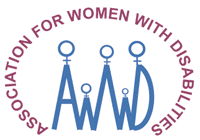
AWWD is a grass roots non-profit organization formed in 2002 with 2 units in West Bengal, India. Primarily working in Kolkata’s slums and 24 South Pargana – an area of rural deprivation; AWWD works with poor, young and disabled women who are denied their fundamental human rights even on a daily basis. The heart AWWD’s work is capacity building at the individual, collective and societal levels. AWWD focuses on enabling girls and women to take control of their lives including their social, economic, cultural, political and material resources and become part of mainstream society. The organization also creates platforms for women with disabilities to collectively raise their voices, undertake advocacy and awareness building activities with key societal stakeholders and works in partnerships with NGO’s and CBO’s to influence policy and legislation. It works towards long term sustainable mainstreaming, community engagement, and advocacy & awareness. For more information see the AWWD website.
Bangladesh Protibandhi Kallyan Somity (BPKS)

BPKS is a pioneer organization comprised of people with all types of disabilities. It was established in 1985 under the leadership of the Executive Director Mr. Md. Abdus Sattar Dulal, a person with a disability. As a non-governmental, voluntary organization in Bangladesh, BPKS acts to safeguard the rights of disabled people to ensure equal rights, opportunities and mainstreaming the people with disabilities into the development process, so that they can contribute to nation building activities as equal citizens. BPKS is registered with the Government and is managed democratically by a 'National Council' and a 'National Executive Council' each comprised of nominated representatives with disabilities. BPKS initiated the, "Persons with Disabilities' Self-Initiatives to Development (PSID)" a disabled people lead right-based long-term need-focused holistic approach, which works to improve and change social structures, policy and systems so that the development process is an appropriate and effective one for everyone including people with disabilities. There are over 1500 grassroots disabled peoples' organizations including 20 permanent PSID resource centers with more than 35,000 people with disabilities as direct grassroots members of those organizations. For more information see the BPKS website.
National Federation of the Disabled Nepal

National Federation of the Disabled Nepal (NFDN) is national umbrella network working for promoting the rights of persons with disabilities for last 20 years. NFDN is representing more than 300 member organizations working on disability issues (mostly the organizations run by the persons with disabilities) throughout the country. As the civil society organization, NFDN is very much instrumental to influence the government agencies and policy makers for the formulation of disability related policies, laws, program and their implementation as well. Advocacy, Awareness raising, Capacity Building and Networking & Collaboration are the key working strategies of NFDN. Internationally NFDN has been recognized as the member assembly of Disabled Peoples' International (DPI) and president of DPI Asia Pacific and nationally it is representing the whole disabled community of Nepal in the various government bodies such as Special Education Council, Law Reformation Commission, National Development Councils etc. For more information see the National Federation of the Disabled Nepal website.
Swadhikaar Center for Disabilities, India
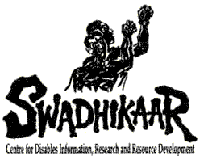
Swadhikaar Centre for Disabilities Information, Research and Resource Development is a national Disabled Persons’ Organization based in Andhra Pradesh. Established and registered as a society in 2004, Swadhikaar’s vision is to ensure a just world, with equality and non-discrimination for persons with disabilities. Swadhikaar’s mission is to work with persons with disabilities to promote inclusion and equal opportunities in society and governance. Swadhikaar’s work focuses on advancing rights of persons with disabilities to live with dignity, with particular focus on women, Dalits, Aadivaasis and minorities struggling against marginalization and vulnerability. Swadhikaar continuously works to understand vulnerability of these groups and works towards social justice in all its activities. Swadhikaar facilitates legal literacy training on human rights and serves to link DPOs across India to share, learn and spread strategies to negotiate with the State to protect and promote quality of life. Swadhikaar makes recommendations for inclusions to the state and the national governments.
Disabled Peoples International, Asia Pacific
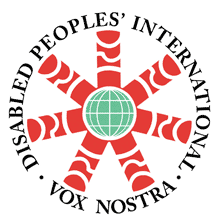
Disabled People's International (DPI) is a world cross-disability, self-help, human rights organizations of persons with disabilities established in 1981. They have been promoting full-participation and equalization of opportunity of persons with disabilities by delivering A voice of our own
. They hold special consultative status for the United Nations and have collaborated with many other international agencies as well. Disabled People's International Asia-Pacific (DPI/AP) has been playing an important role in the disability movement of Asia-Pacific Region.
The Regional Development Office was moved to Metropolitan Bangkok in 1999 to further promote disability movement in the Asia-Pacific Region. For more information see the visit the Disabled Peoples International, Asia Pacific website.
Council for Social Development, India

Council for Social Development (CSD), Hyderabad is an ICSSR Research Institute founded by Dr. Durgabai Deshmukh in 1962. The Director of CSD Hyderabad is Professpor Kalpana Kannabiran, a distinguished scholar whose research interests have focused on sociology of law, social movements, gender studies, disability studies and jurisprudence – especially focusing non-discrimination and criminal law. The primary mission of CSD Hyderabad is to provide research scholars with a space for innovative research and writing that simultaneously addresses critical needs of pluralism, democracy, diversity and social justice in the context of development and globalization. In focusing on the social sciences and law, CSD aims to provide a context for the exploration of the intellectual histories of different disciplines and interdisciplinary areas that draws on the rich history of critical engagements, resistance, anti-colonial struggles, and philosophies of justice in the global south, especially in the Indian sub-continent. CSD encourages new practices in research and intellectual engagement that are based on non-hierarchical international collaborations and exchanges; and social action based academic endeavour in relation to communities that are marginalized and vulnerable. Current areas of work include Adivasi Studies, Gender Studies, Critical Disability Studies, Environment Studies, Studies on Traditional Artisanry, Labour and Employment Studies, Interdisciplinary Law and Dalit Studies. For more information see the CSD website.
Contact Information
- Marcia Rioux, Project Leader
- Paula Hearn, Project Coordinator
Telephone: 1-416-736-2100 ext. 20718
E-Mail: drpi_aware@yorku.ca
Fax: 1-416-736-5986
4700 Keele Street, Toronto, ON
Canada M3J 1P3
